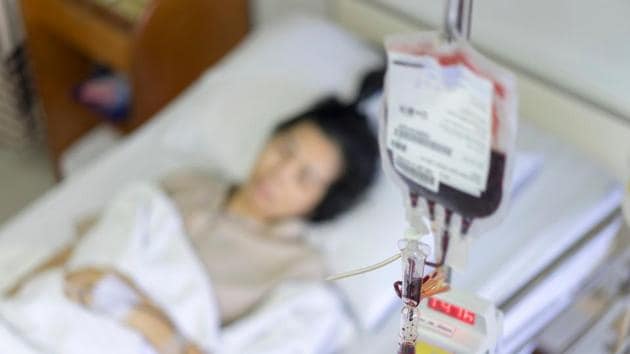
Cancer Patients, Beware: Don’t Fall for These Costly Radiation Therapy Myths
2 months ago | 5 Views
The most ancient method of cancer treatment is radiation therapy, which was referenced by Hippocrates. He is recorded as having employed heat in the treatment of breast cancer, stating, “What medicines do not heal, the lance will; what the lance does not heal, fire will.” In this context, “fire” refers to hyperthermia, a variant of radiation therapy. However, there remains a degree of uncertainty, misunderstanding, and misconceptions surrounding this topic. Let us delve into these issues.
What is radiation therapy or radiotherapy?
In a discussion with Lifestyle, Dr. (Lt Col) Ashok Kumar, Senior Consultant and Head of Radiation Oncology at Sarvodaya Hospital in Faridabad's Sector-8, stated, “Radiation therapy is a type of cancer treatment that employs high-energy beams to target cancerous cells. This clinical approach involves the application of ionizing radiation for the management of patients suffering from malignant tumours, and in some cases, benign conditions.”
He further explained, “The primary objective of radiation therapy is to administer a carefully calculated dose of radiation to a specific tumour area while minimizing damage to the adjacent healthy tissues. This approach aims to eliminate the tumour, enhance the quality of life, and extend survival or alleviate symptoms, all while maintaining a reasonable cost.”

Radiation therapy is not only essential for curative treatments but also significantly contributes to cancer management by effectively alleviating or preventing disease-related symptoms. Dr Ashok Kumar emphasized that "pain relief, restoration of luminal patency, preservation of skeletal integrity, and re-establishment of organ function can be achieved with minimal morbidity, all while aiming to eradicate cancer cells and protect healthy cells to the greatest extent possible."
What types of radiation are there?
Dr Ashok Kumar emphasized that the predominant type of radiation therapy is known as external beam radiation therapy, which provides targeted treatment modalities such as IGRT, IMRT, 3D-CRT, VMAT, SRS, and SRT, in conjunction with 4D Gating techniques (DIBH/Respiratory Gating). Typically, X-rays are generated by a device called a linear accelerator, which rotates around the patient to administer radiation from various angles. Other modalities include electron therapy and advanced techniques such as proton beam therapy.
He further noted that another prevalent form of radiation treatment is brachytherapy, where the radiation dose is delivered internally at the tumour's centre, akin to a "surgical strike." This method is applicable for treating cervical, uterine, prostate, and breast cancers, among others. The procedure involves the placement of small radioactive sources within the body, either on a permanent or temporary basis.
Radiation therapy myths
Dr. Ashok Kumar dispelled several prevalent misconceptions regarding radiation therapy.
1. Radiation therapy is only for the last stage of cancer treatment
This statement is inaccurate. Numerous types of cancer have been treated with radiation as an initial and definitive therapeutic approach, resulting in complete cures. In certain instances, radiation therapy may be supplemented with chemotherapy to enhance its effectiveness. Therefore, it is incorrect to assert that radiation is utilized solely in the advanced stages of cancer treatment.

2. Severe side effects
This statement is inaccurate. The introduction of cutting-edge technologies and improvements in treatment methods for radiation therapy have resulted in significantly reduced side effects, which are generally confined to the period of treatment. While certain side effects may continue after the conclusion of radiation therapy, they can typically be addressed without the need for extensive intervention. Therefore, radiation therapy is considered to be both safe and effective, with minimal adverse effects.
3. You cannot walk during radiation therapy
There are no limitations on employment while undergoing radiation therapy; however, it is recommended to rest during the treatment to prevent any potential complications.
4. Outdated and ineffective
Radiation therapy constitutes a fundamental component of cancer treatment. With recent technological advancements, it has become increasingly precise, cost-effective, and accessible, making it one of the most effective therapeutic options for various types of cancer.
5. Radiation therapy is painful
Radiation therapy is not associated with pain. While patients might experience some discomfort during the processes of mould creation or the positioning of devices—both of which are essential aspects of radiation therapy—the overall procedure is entirely painless.
6. Generalised hair loss
Radiation therapy does not result in widespread hair loss; rather, it is confined to the specific area undergoing treatment. For those experiencing hair loss on the scalp, various alternatives are available, such as wearing a wig to maintain a general or aesthetic appearance. It is important to note that this type of hair loss differs significantly from the generalized hair loss associated with chemotherapy.
7. Makes one radioactive
This statement is entirely inaccurate. A patient undergoing radiation therapy can maintain a normal family life, and family members need not be concerned about being near the patient.
Dr. Ashok Kumar stated, “Grasping the realities of radiation therapy can help dispel fears and misunderstandings, enabling patients to make educated choices regarding their treatment alternatives. By dispelling these prevalent myths, we aim to offer clarity and assistance to individuals facing their cancer journey. Together, we will overcome cancer.”
Read Also: Want Toned Abs? Try These 5 Powerful Workouts to Kickstart Your Fitness Journey!
Get the latest Bollywood entertainment news, trending celebrity news, latest celebrity news, new movie reviews, latest entertainment news, latest Bollywood news, and Bollywood celebrity fashion & style updates!
HOW DID YOU LIKE THIS ARTICLE? CHOOSE YOUR EMOTICON!
# Cancer # Diabetes # Diet




















